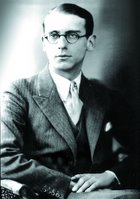 I love this book — Firmin: Adventures of a Metropolitan Lowlife, by Sam Savage, from Coffee House Press.
I love this book — Firmin: Adventures of a Metropolitan Lowlife, by Sam Savage, from Coffee House Press.It's charming. A rat who reads and eats books. Love and reverence for books. The comfort books provide both body and mind. While I'm drawn to books about books, booklovers' books, they often disappoint me — too much sentiment or too much sermon, often just meaningless name-dropping. In Firmin, the book-love is just enough in evidence without ever feeling like a cheap trick. Firmin the rat is hopelessly romantic; Firmin the novel is not.
From a very simple premise, we have a window onto humanity and despair through the cracks in the margins of existence. It's seedy, and brimming with life. And surprisingly gentle.
Firmin begins his life in a used books store; he is far too busy absorbing and being absorbed by books to know a real rat's life. It's a while before Firmin is able to distinguish fiction from nonfiction, and though he consumes plenty of it, it's questionable whether he ever fully digests it. Apart from books, Firmin's pleasure is to scurry out among the lowlifes to take in late-night pornographic movies at the local theatre, which carries a different kind of romance altogether. His world is turned upside down when he discovers all is not as he imagines it to be, people are not what they seem — the proprietor tries to kill him. Firmin sets out to make contact with humans; his effort is disastrous, but it brings him into a relationship, complicated and beautiful in its way, with the science fiction writer who lives upstairs from the shop. This time, Firmin has a greater understanding of the dynamic he has entered into:
Jerry talked and I listened. Gradually I learned more and more about his life, while he, one can safely say, learned less and less about mine. Due to my natural reticence, he had a free hand with my personality. He could pretty much make me into whomever he wanted, and it was soon painfully clear that when he looked at me what he mainly saw was a cute animal, clownish and a little stupid, something like a very small dog with buckteeth. He had no inkling of my true character, that I was in fact grossly cynical, moderately vicious, and a melancholy genius, or that I had read more books than he had. I love Jerry, but I feared that what he loved in return was not me but a figment of his imagination. I knew all about being in love with figments. And in my heart I always knew, although I liked to pretend otherwise, that during our evening together, when he would drink and talk, he was really just talking to himself.
The thing. Two things.
One: The novel opens with a couple epigrams, one being that old teaching "...he did not know whether he was a man dreaming that he was a butterfly or a butterfly dreaming that he was a man." In Firmin, there's a kind of metamorphosis, from rat to human, from fiction to life, and both back again.
Two: Jerry's novel is about an alien race that mistakes rats as the dominant species of Earth. (Which is maybe why Firmin likes Jerry.) It merits a little consideration, that there is something — no, not dominant, but — meaningful in the human rats, the marginalized, the forgotten, the drunks and the whores. What it is to be human. To be the protagonist of one's own narrative.
I began to spend most of every day on my back, all four feet in the air, dreaming and remembering, or else playing the piano, remembering and dreaming. I could see that my dreams were changing. They were getting soft and nostalgic, with a kind of crepuscular flare around the edges, and I didn't have many exciting adventures anymore. I missed the past terribly, even the awful parts. I never forget anything that has happened to me and scarcely anything that I have read, so by that time I had stored up an awful lot of memories. My brain was like a gigantic warehouse — you could get lost in it, lose track of time, peeking into boxes and cases, wandering knee-deep in dust, and not find your way our for days. Sometime shortly after I moved in with Jerry I had begun to play with the past, tweaking it this way and that to make it more like a real story, and I had begun mixing my memories with my dreams. This was probably a mistake, since the more I played with them the more they came to resemble each other, and it was harder and harder for me to tell the things I remembered from the things I invented. I was now, for example, unsure which of the figures was really Mama, the fat greedy one or the thin, worn sweet one, and whether her name was Flo of Deedee of Gwendolyn. All the archives existed only in my mind. I had no external check, no diary, no old family friend. How could I verify? All I could do was compare one mental image with another image, equally suspect, and in the end they all got tangled together. My mind was a labyrinth, enticing or terrifying according to my mood. I was losing my footing, and the odd thing was that I didn't care.
See the discussion at the LitBlog Co-op (a couple posts aren't properly tagged, including the comments by Sam Savage himself, so check the November archives to get all the good bits).
Really, an excellent read.













